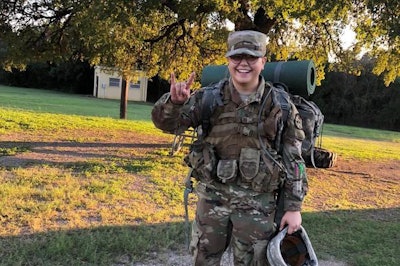University of Texas at Austin (UT Austin) freshman Map Pesqueira claims he lost his three-year scholarship through the college’s Army Reserve Officer Training Corps (AROTC) program because he is transgender.
The three-year scholarship goes into effect Pesquiera’s sophomore year, however, because he is transgender, he has been prohibited from using the scholarship because of a Department of Defense policy, Pesquiera wrote on GoFundMe.
 Map Pesqueira
Map PesqueiraPesqueira said that he is now struggling to find a way to afford his college education and doesn’t know if he will have the funds to return to the campus for his sophomore year. He created a GoFundMe page to raise money for his tuition on April 11. As of April 18, Pesqueira has raised nearly $21,000 of his $27,000 goal.
There are several requirements that students must fulfill in order to receive the scholarship from the university, such as being a high school graduate pursuing an Army-approved college major and agreeing to “accept a commission as either a Regular Army, Army National Guard or U.S Army Reserve officer” according to officials at UT Austin.
The scholarship also requires students to enter the Army after graduating. As a result of the Trump administration’s recent transgender military ban, Pesqueira is technically barred from doing so, according to CBS News.
Pesqueria blames the ban for his scholarship loss.
Pesqueira began medically transitioning in 2018 and is currently on hormone replacement therapy. In addition, he legally changed his name and gender marker after he received top surgery.
“Because I have started medically transitioning, my scholarship is now void,” he wrote on his GoFundMe.
Pesqueira chose to attend UT Austin because of the AROTC scholarship program and because of its status of being one of the best film schools in the nation. He is pursuing a degree in radio, TV and film and said he is very active on campus.
“I received little financial aid from the university despite having a single mother with a low-income and struggled to pay my own way through my first year,” Pesquiera wrote. “Until now, I remained under the impression that my scholarship would take care of my remaining 3 years, but that is no longer the case.”















